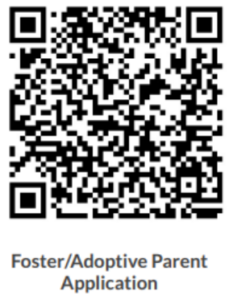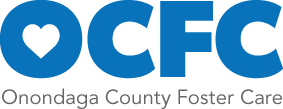Frequently Asked Questions
Who should consider foster parenting?
We are looking for dedicated families that are willing to share their lives, love and knowledge with children in need of a loving home. Becoming a foster family in Onondaga County is one of the most challenging and rewarding ways to give back to your community.
We ask our families to work in partnership with the county and birth parents toward the goal of one-day reuniting children with their families.
Foster parents are as diverse as the children placed in their homes. In fact, the only characteristics common to all successful foster parents are a genuine love of children and a desire to make a difference in their lives.
Prospective foster homes come from many different backgrounds, and reasons for wanting to become foster parents. Some are married, some are single. They range in age from 21 to the senior years. Some have biological children living at home, while others are empty-nesters or have never been parents. They may be employed part-time or full-time.
Foster parents are committed to making a difference in the life of a child. They want to help strengthen local families and their community. For some, foster parenting is the first step toward adopting one or more children, and starting a family.
How do I get started?

Welcome to the Onondaga County Foster Care Program. We are glad you are here! In order to become a a foster parent, you will need to enter your application information into the BINTI software.
To create a BINTI account please use the following link:
https://family.binti.com/users/signup/onondaga-county-initial
You can also open your BINTI account using the QR code: Please call for the code if you have not received this information from CPS or your caseworker or have not spoken with the Foster Parent Training Team.
Who are the children?
Children of all ages come into care, but often our greatest need is finding families who are willing to accept sibling groups, teenagers and children with special needs into their homes. Children enter into our care for a variety of reasons, but primarily due to a history of abuse and neglect. These children could greatly benefit from a supportive and caring home environment.
What are the requirements for becoming a foster parent?
The basic requirements for an applicant are that they must be 21 years of age, be financially stable with a steady means of income, have a spare bedroom in your home or rented apartment, and have a way for us to contact you. Once you complete the intake process and are accepted into training, further clearances will be completed including criminal history, child abuse screenings, and a home study.
What options are offered for foster parent certification training?
Our training for Foster/Adoptive Parents is an 11-week course covering a variety of topics designed to assist families in meeting the needs of children in care. The training program may also help you in making an informed decision on whether or not opening your home to children in care is right for you.
Where are the foster parent certification training sites?
We hold our foster parent training classes in various places in the community. Once you are accepted into training, you will be notified of where the location of your training class will be.
What kind of assistance do foster parents receive?
To help you achieve that, foster parent supports include:
- Extensive training in all aspects of parenting, behavior management and working in partnership with case workers and biological parents
- Guidance through the New York State certification process
- A stipend to meet the youth’s needs
- Medicaid medical coverage for the child
- Mileage reimbursement
- 24/7 support
- Respite services
Do foster parents adopt?
Yes, many foster parents do adopt children through the foster care process. The Onondaga County Department of Children and Family Services, the top priority is the preservation of families. When a child comes into care, our mission is to reunify them with their birth family or have them placed with relatives.
To accomplish this goal, we work with families and local service providers in an effort to increase safety and reduce risk in the home. When that goal is no longer possible, a child in care will become eligible for adoption through a voluntary surrender or a termination of parental rights. At that time, the county looks to the foster family possibly becoming an adoptive resource for a child.
What if I'm not ready to become a full-time foster parent? What else can I do?
Not quite ready to make the commitment to foster parenting? There are other ways you can help!
Here are just a few ways to get involved in a way that fits your schedule and lifestyle:
- Request a speaker to present at your organization, church or other gathering.
- Call our intake line at 315.435.3827 and ask for flyers, brochures, or posters to put up in your business, gym, church, and/or community.
- Refer people to our website if you hear they are interested in fostering.
What's the greatest foster care need in Onondaga County?
While every child in the foster system simply needs love and stability, teens, sibling groups, and children with special needs benefit the most from the open hearts and homes of Onondaga County. We understand teens can come with unique challenges. But, our services aimed at teens and foster families make things a lot less “scary” for the children and adults alike. Another one of our biggest needs is foster homes able to take in larger sibling groups of 3 or more children.
Can I be a foster parent to a family member?
Yes. Onondaga County Foster Care links foster parents related by blood, adoption or marriage to the Kinship Guardianship Program (KinGAP). KinGAP helps prevent legal issues with birth parents and connect fostering relatives with financial resources as well. If you’re already foster parenting a relative, we can connect you with the essential benefits needed in sensitive situations like yours.
Learn more about fostering a family member here.
Do foster parents have to be married?
No. Foster parents simply need to have a stable home and finances capable of providing competent care. Onondaga County Foster Care is open to people of any marital status, ethnicity, religion or sexual orientation.
Will I receive any financial assistance to be a foster parent?
Yes, one of the supports for opening your home to children in care is a monthly stipend intended to help cover the costs of caring for a child such as food, clothing, and other expenses one encounters when caring for a child. Onondaga County also covers the medical expenses of a child in care.
Can I choose the age of the child placed in my care?
Yes. While, our greatest need in Onondaga County is foster care for teens ages 11 to 18, we also have a need for homes to take in infants, toddlers, young children, and pre-teens. We will work with you in determining the best fit for your family. We also have a large need for placing sibling groups of 3 or more children.
How long will the children be placed in my home?
The ultimate goal the Onondaga County Department of Children and Family Services is to reunite children with their birth families. To that end, the length of time a child stays in a foster home varies greatly.
What if there is difficulty during transition?
The Onondaga County Department of Children and Family Services is here to provide all the support necessary to create a successful experience for both the foster parent and child. We offer many services for convenience and the assurance foster children receive the love and stability as you all work toward reunification with the birth family.
What if my foster child doesn't get along with my children?
We do everything possible to assure foster parents and families are paired with the right child. We work ahead of time assessing the home and learning about your existing family before making the best match to prevent conflicts. If there are any problems with the transition from the foster care system to foster home life, we are here to assist in every aspect of care to come to a resolution.
